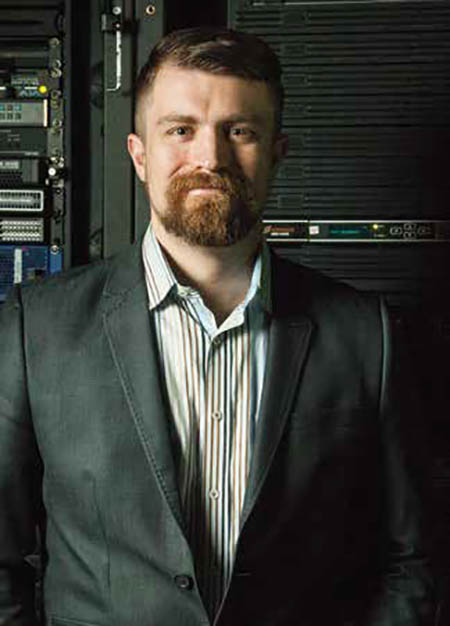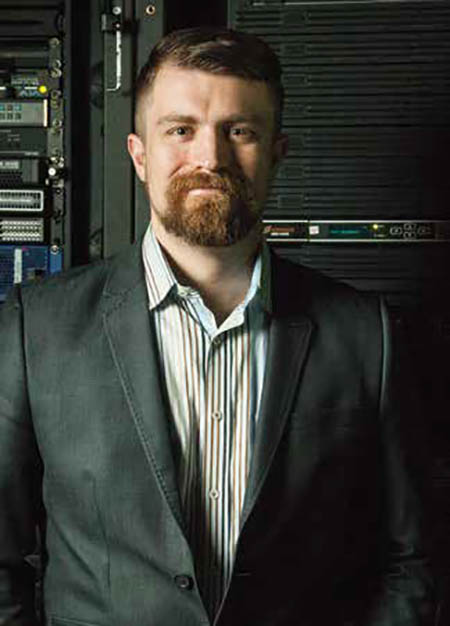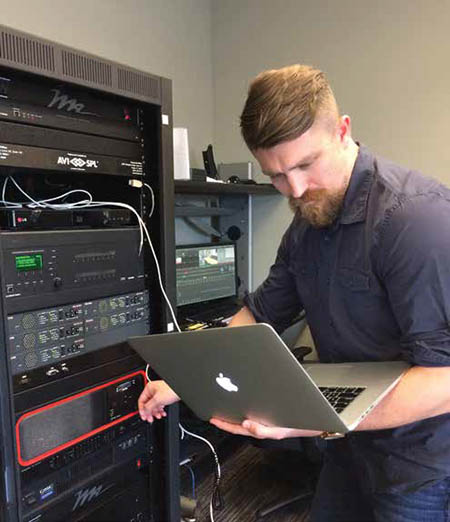Meet Your Manager: Joey North, Elemental Technologies

A daily selection of features, industry news, and analysis for AV/IT professionals. Sign up below.
You are now subscribed
Your newsletter sign-up was successful

Joey North, IT manager, Elemental Technologies. Photo by Gregory Bartning.
Q&A with Joey North, IT Manager of Elemental Technologies, Portland, OregonPortland, Oregon-based Elemental Technologies is on a mission. The company creates software-defined video processing solutions that they believe offer greater levels of scalability, flexibility, and performance over legacy hardware. Elemental relies on general purpose processors so functions can be virtualized or reside in the cloud, with resources ramped up or down based on demand. This core competence is ideal for content programmers who must stay current with rapidly shifting consumer demands, streaming protocols, compression standards, and video formats, such as 4K and HEVC/H.265. User-friendly AV and IT tools help the Elemental team collaborate so projects can run smoothly. No one knows the importance of reliable tech better than Joey North, the company’s IT manager. We sat down with Joey to get his in-house manager’s perspective on AV/IT convergence, bandwidth, and how to support streaming in an ever-evolving BYOx world.
AV Technology Editors: How is AV/IT convergence playing out in your company’s facility?
Joey North: In a traditional sense, AV/IT convergence is present in our facility by way of digital signage, boardroom whiteboards, and conference room equipment. As a smaller company, Elemental does not have the same pressing need for convergence as larger corporations. Generally, our internal end-users have what I’d consider traditional AV requirements, but with the need for a wide range of different systems.
However, for Elemental product development and testing groups, AV/IT convergence is a necessity. Due to the nature of our products—software-defined video solutions for live, streamed, file and cloud-based multi-screen delivery of content for the world’s leading broadcasters, pay TV providers, enterprise customers and content programmers—our engineers need AV equipment and devices that enable system-wide monitoring. These are used for both reporting and ensuring the integrity of our QA processes when developing and testing video processing solutions.

For Elemental product development and testing groups, AV/IT convergence is a necessity.
Photo by Olivia Ross.
What AV/IT problems have you solved recently?
Joey North: Most of our IT team’s recent work has been focused on cross-training engineers in IT and software video product development/test disciplines. Some people have extensive background in IT, while others are experts in video. IT and AV professional skills will continue to converge as the world moves to IP. We’ve seen this happen at Elemental as we continue to accelerate the launch of software-defined video solutions for multi-screen content delivery.
Our unique environment requires that the IT staff have a strong understanding of AV/video software and equipment so they can integrate systems into our infrastructure, as well as provide training to developers who might traditionally only focus on one part of this work-flow.
A daily selection of features, industry news, and analysis for tech managers. Sign up below.
What types of new tech or products do you want to learn more about?
Joey North: The Elemental IT team is exploring several approaches to software defined networking (SDN). SDN is crucial to staying agile and scalable, so we have started looking towards SDN to give our own employees more flexibility—just as we have already done for our customers. Our rapid growth as a start-up demands an innovative infrastructure that can support the business without long upgrade cycles.
What AV/IT do you hope to buy in the near future?
Joey North: A Unified Communications solution, coupled with an easy-to-use knowledge management system, will be key to keeping our remote and in-house staff collaborating. The days of desk phones and email as primary means of collaboration are gone. Users (and customers) want information instantly and easily on any device, anywhere.
Where are tech manufacturers getting it wrong or missing opportunities?
Joey North: The difficulty in integrating between some manufacturers and systems is troubling. If you want a best-in-class solution for each problem, you can rarely rely on one ecosystem. For example, innovators like Apple have great, easy-to-use technologies, but they are not very customizable. On the flip side, open-source products are great for integration and customization, but are less user-friendly. It’s certainly not my preference to have to make a decision between the two.
My hope for the future is that companies will work together to create a middle ground and “play nice” with their competitors. Both Apple and open-source products have their upsides, but it’s frustrating to have to choose one or the other if you want everything to work well inline, especially when end-users have specific preferences.
What are your collaboration strategies?
Joey North: Offering a platform for collaboration that is both enjoyable and easy-to-use is paramount in intense advanced technology and software solution development environments like Elemental.
If both aspects aren’t present, people will find alternative methods for collaboration, which excludes people from conversations, losing visibility and input. There is currently a wide-range of collaboration strategies available for businesses, and Elemental offers several platforms for our users to select. However, finding a single platform that works well and is enjoyed by everyone is something we are still working hard to find.
Fast Facts: Elemental
• Elemental offers a history & culture class to all new employees
• Company-hosted weekly lunch lectures
• The company holds eight patents & has 15 pending around its IP
• More than 1,300 hours spent volunteering in 2014
• Named among the 100 best companies to work for in Oregon
Source: www.elementaltechnologies.com
Margot Douaihy, Ph.D., is a lecturer at Franklin Pierce University.

